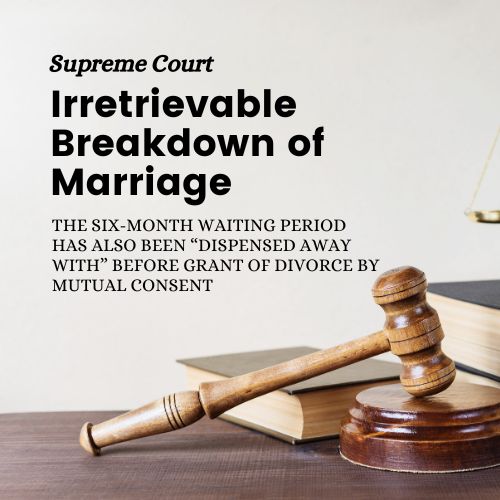Divorce is a life-altering event that brings significant emotional and legal challenges. In many jurisdictions worldwide, divorce can be granted on various grounds, each rooted in specific legal principles.
One such ground that has gained prominence in recent years is the “irretrievable breakdown” of a marriage. This concept recognizes that not all divorces are the result of fault-based reasons like adultery or cruelty.
Instead, it acknowledges that sometimes marriages simply cannot be sustained due to fundamental and irreversible differences between the spouses.

In this blog, we will delve into the idea that divorce can be granted on the grounds of irretrievable breakdown, exploring what it means, how it’s established, and its implications for individuals seeking to end their marriages.
Understanding this concept is essential for anyone contemplating divorce or interested in the evolving landscape of family law.
In India, divorce on the grounds of “irretrievable breakdown of marriage” is a unique and robust legal concept. It falls under the exclusive jurisdiction of the Supreme Court of India, as granted by Article 142 of the Constitution.
This provision allows the Supreme Court to exercise discretion and grant divorce when all other attempts at reconciliation have failed.
Unlike High Courts and family courts, the Supreme Court has the authority to ensure a just resolution for both parties involved in a marriage that has become irreparable.
This blog will delve into the practical implications and criteria the Supreme Court uses when considering such divorces, shedding light on this evolving facet of family law in India.
Supreme Court’s Swift Divorce Decree via Article 142
According to the Newspaper – The Hindu, in a landmark move, the Supreme Court of India has harnessed the extraordinary powers bestowed by Article 142 of the Constitution to provide swift relief to couples trapped in tumultuous marriages.
This discretion, termed a tool for “complete justice,” is now being used to grant divorces by mutual consent.
It spares couples the prolonged agony of waiting for local courts to finalize their annulments, which often took six to 18 months.
This decision has broader implications, as it signifies the Court’s commitment to expediting legal processes, not only in divorce cases but also in matters such as domestic violence and dowry-related disputes.
By invoking Article 142, the Supreme Court seeks to ensure that justice is not delayed and that individuals can promptly move forward with their lives.
This landmark decision demonstrates the Court’s adaptability to modern challenges and its dedication to providing timely and just resolutions for individuals in distressing situations.
It is a significant step towards alleviating the suffering of those caught in strained marriages. It underlines the evolving nature of the Indian legal system.
Supporting Document:
To provide concrete evidence and support the information discussed in this blog post, we have attached a PDF document summarizing the Supreme Court’s decision regarding using Article 142 for expedited divorces and related legal proceedings.
This document includes key excerpts from the Court’s ruling. It offers additional context to bolster understanding this significant development in Indian family law.
We encourage our readers to review the attached PDF for a more in-depth perspective on this groundbreaking decision by the Supreme Court of India.
We believe this supplementary material will enhance the clarity and credibility of the information presented in this blog post, allowing our readers to understand the topic at hand.
Bhatla Law Firm – Your Trusted Legal Partner
In navigating the complexities of divorce, having the proper legal support is paramount. This is where Bhatla Law Firm, known as the Best Divorce Lawyer in Delhi, can provide invaluable assistance.
With expertise in family law and specialization in mutual divorce cases, Bhatla Law Firm is a reliable partner for individuals seeking divorce by mutual consent in Delhi.
Their commitment to excellence and dedication to protecting the rights and interests of their clients has earned them a stellar reputation as the go-to Mutual Divorce Lawyer in Delhi.
Accessibility and Expertise Combined
Regarding matters as sensitive as divorce, having the proper legal representation can make all the difference. Bhatla Law Firm offers affordable services, making top-tier legal counsel accessible to all. Whether in Patiala House Court or elsewhere in Delhi, their dedicated team is ready to assist you throughout your mutual divorce proceedings.
Navigating the Evolving Legal Landscape
In India, the legal landscape is continuously evolving, and recent developments have empowered the Supreme Court to expedite divorces by mutual consent through Article 142 of the Constitution.
This is a significant step towards providing swift and just resolutions for couples caught in strained marriages.
Bhatla Law Firm understands these legal dynamics and ensures that your rights are protected within this evolving legal framework.
Bhatla Law Firm, the Mutual Divorce Lawyer in Delhi, is crucial in guiding individuals through this challenging journey, ensuring their client’s interests are safeguarded while providing expert legal guidance.
If you need the Best Divorce Lawyer in Delhi, consider reaching out to Bhatla Law Firm to navigate the complexities of divorce with confidence and efficiency.
Conclusion:
In conclusion, divorce on the grounds of irretrievable breakdown has become a pivotal legal concept, recognizing that not all divorces stem from fault-based reasons.
This blog has explored its meaning, establishment, and implications for those seeking to end their marriages.
Furthermore, in India, the Supreme Court’s use of Article 142 to expedite divorces and resolve related disputes demonstrates a progressive approach to family law.
This approach ensures that justice is not delayed, particularly in cases of domestic violence and dowry-related disputes.
For further insights, we’ve attached a PDF summarizing the Supreme Court’s decision, enhancing the credibility and understanding of this evolution in Indian family law.
Also read: Cheque bounce lawyer in Delhi , best divorce advocate in Delhi , Divorce Lawyer in Patiala House Court

Kamal Bhatla, the driving force behind Bhatla Law Firm, is renowned in Delhi’s legal community. With a focus on divorce law, he has earned the firm the title of the Best Divorce Lawyer in Delhi. Beyond divorce, the firm excels in resolving Cheque Bounce disputes. Kamal Bhatla’s commitment to excellence and a team of experienced lawyers have led to their recognition as the Best Law Firm in Delhi. Choose Bhatla Law Firm for top-tier legal services that prioritize your rights and deliver outstanding solutions. Explore their comprehensive legal services today.


